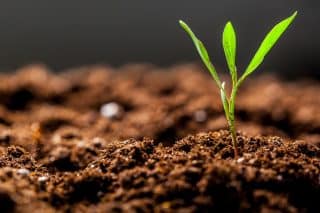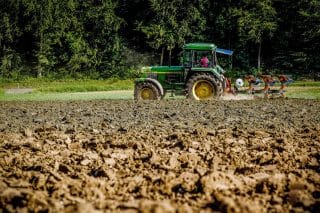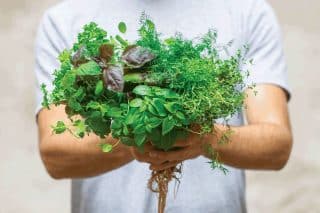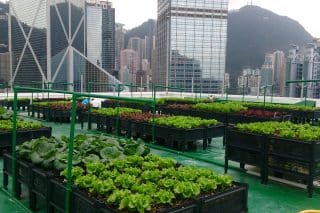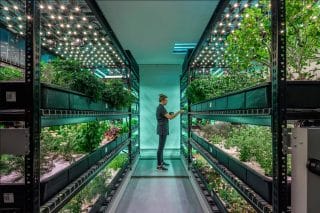Today, the level of trust in conventional grocery store products in general is waning. People are looking for more transparency and want to know where their food is coming from. They want to prevent the illnesses, such as diabetes, which have been spiking since the growth of industrial farming. As the organic movement is slowly bought out by big agriculture businesses, consumers also question their practices.
“Industrial or factory farming is inherently impersonal, you don’t know who produced what you’re buying,” John Ikerd, retired professor and thought leader of the concept ‘deep sustainability’ and green living movement, told AgriExpo e-Magazine.
Small farms offer a community connection, consumers who appreciate local produce can actually visit the farms and get to know their farmers.
More and more people are leaving their desk jobs to create small farms.
Likewise, more and more people are leaving their desk jobs to create small farms. These small farmers are not only responding to consumer interest, but to the desire to create community and work on a more human scale. In regards to large farms, the fact that the younger generations aren’t interested in working the family farm is not the only reason farms aren’t what they used to be.
“Having that much land is just too expensive and applying for a loan to buy thousands of acres would be laughed at today,” Tamara Benjamin said in an interview with AgriExpo e-Magazine. Benjamin is the assistant program leader of Diversified Farming and Food Systems at Purdue University and is on the committee of the Indiana Small Farms Conference, a conference driven by farmer content, centering on the networking for and by small farmers.

Indiana Small Farm Conference 2018
While there are industrial farmers who want to diversify and downscale, financial investments in industrial farming equipment, as well as government incentives that offer subsidies to factory farming, make converting to a small farm less likely. Comparing the financial consequences of converting from big to little, small farms are actually easier to start from scratch.
Yet, as land prices rise, in the US and Europe, even starting off small can be intimidating. However, there are interesting options for small farmers taking on their new project. For those who want to share, planned development communities or agri-hoods allow members of the community access to or rent access to a plot for farming that can then be sold in the neighborhood. Sustainable land trusts (like this one) give farmers with large pieces of land tax incentive to pass the rights to the trust that lets small farmers rent and farm on that land.
Use Less to Make More
The goal with a small farm is to create “more economic value from less land and less money invested,” John Ikerd emphasized.
Both Benjamin and Ikerd stressed that small farmers are more inclined to be creative and try alternative forms of planting, growing, and selling due to the precarious and pioneering nature of their small businesses. As consumers become more intrigued with what’s new and different, this will only strengthen the connection they seek to have with local small farmers.
Although it’s a difficult commitment to run a small farm (or any farm!), technology is making it easier as much as the small business models breed innovation. Furthermore, programs like SARE are supporting research on farms while conferences like Purdue’s previously mentioned small farms conference or networking sites such as GreenHorns and The National Young Farmers Association, or small farm central are crucial for learning.
Making It Work
Small farms work with and not against each other by remaining niche, such as becoming a specialist in farming asparagus. “It’s the only way to go because produce like corn or beans are for the big farms,” Benjamin underscored.
If each small farm in a locality has different crops that adhere to local needs, they have more chance of profit because there’s no way they can be in competition with larger farms that grow corn or beans. They also have the possibility of participating in food bundle programs like food hubs. As Professor Ikerd explained:
Food hubs are an excellent way to create sales beyond the outdoor market. Food Hubs basically act as agents, working with small farmers in an area to pool their products and redistributing to institutional industries such as restaurants, schools and hospitals.
In line with the pooling of produce, small farmers are collaborating with the usage of tools, labor and knowledge alike. High costs, tight profits and limited land, the ability to buy industrial tools isn’t obvious, which means partial ownership through partnered purchases helps everyone keep up with their small business. While collaborating helps, in-field labor has become quite an issue. People no longer want to work on their knees for $12 an hour and, with immigration issues at hand, farmers are struggling.

Portraits at Felege Hiywot Center near downtown Indianapolis on April 6, 2018.
Relationships: Working for a Community
The work-life balance is a problem that is often neglected, which is why small farmers need each other. “The real challenge is relationships,”Ikerd indicated. Handling projects on the farm, distributing labor and improving sales is the development of relationships. The interest of running a small farm is not only growing one’s own food, it’s providing for and working with a community.
Ikerd reminded us, “You have to be able to relate to people. Share. If you can, not only do you benefit financially, you also have the desirable quality of life with people who share the same values.”
“It only works if small farmers connect with a population that agrees with these practices,” Benjamin added.
That population is showing up around the country and globe, Ikerd continued:
People think those consumers are always high-end, but that’s not true, many people with modest means want to know where their food is coming from.
As communities turn back to farming on a smaller scale, “a lot of people think that society is regressing,” Ikerd pointed out and affirms:
We’re not going back, but rather regaining a sense of core values.
Through the lens of small farms we can see that values concerning a connection to nature, community organization, career as passion and human connection is at the root of our food source. We have to ask ourselves, “Which of those values did we sacrifice for the sake of economic ‘progress’? Certain principles are timeless.” Ikerd iterated.
Maybe it’s far-fetched but small farms are showing us something: We need each other.

